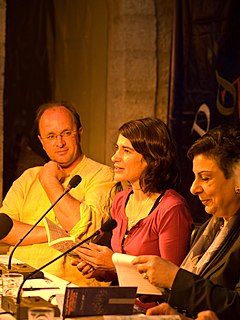A Quote by Esther Freud
Find your best time of the day for writing and write. Don't let anything else interfere. Afterwards it won't matter to you that the kitchen is a mess.
Related Quotes
I can't decide for you whether or not you have got to write, but if anything in the world, war, or pestilence, or famine, or private hunger, or anything, can stop you from writing, then don't write . . . because if anything can even begin to keep you from writing you aren't a writer and you'll be in a hell of a mess until you find out. If you are a writer, you'll still be in a hell of a mess, but you'll have better reasons.
You can do anything you want to [ in ashram] if you can find the time. It's a very rigorous day. It starts at 2:30 in the morning and often doesn't end until midnight, so if you can actually find a moment to have a drink or a smoke, you're quite welcome to, as long as it doesn't interfere with your capacity to follow the schedule.
After a day of writing, I love nothing more than to go into my kitchen and start chopping onions and garlic on the way to cooking an improvised meal with whatever ingredients are on hand. Cooking is the perfect counterpoint to writing. I find it more relaxing than anything else, even naps, walks, or hot baths.
I'm a full-time believer in writing habits...You may be able to do without them if you have genius but most of us only have talent and this is simply something that has to be assisted all the time by physical and mental habits or it dries up and blows awayOf course you have to make your habits in this conform to what you can do. I write only about two hours every day because that's all the energy I have, but I don't let anything interfere with those two hours, at the same time and the same place.
There isn't a single day I don't do some writing -- if you don't, you won't have a book. When you're self-employed it is very easy to burn away your time instead -- answering e-mails, surfing the Internet, or hanging out with friends. You really must have the discipline to sit down and write every day. Most of what I am writing is living in the back of my head or in my subconscious. I find if I write every day, my subconscious will do the job for me.
I try to write every day, preferably first thing in the morning. Of course, there are days when something happens to interfere with this ideal schedule. Then I try to find time later in the day. I usually work at home, but sometimes, for a change I'll go to a library or a cafe. And I like to read poetry before I sit down to write.
The main rule of writing is that if you do it with enough assurance and confidence, you’re allowed to do whatever you like. (That may be a rule for life as well as for writing. But it’s definitely true for writing.) So write your story as it needs to be written. Write it honestly, and tell it as best you can. I’m not sure that there are any other rules. Not ones that matter.
You don't have to be the best guitar player, or have the best voice, or even be the best looking person - writing a song that moves people is worth more than all the other nonsense. (Just look at Bob Dylan - he's got almost no vocal range at all, but his songs are deeply moving and iconic.) If I had to offer one piece of advice: Write a song that moves people, and write it from within yourself. Your personal narrative is more engaging and moving than anything else you can imagine in your mind.
The Nobel Prize is the best thing that can happen to a writer in terms of how it affects your contracts, the publishers, and the seriousness with which your work is taken. On the other hand, it does interfere with your private life, or it can if you let it, and it has zero effect on the writing. It doesn't help you write better and if you let it, it will intimidate you about future projects.
The secret to writing is just to write. Write every day. Never stop writing. Write on every surface you see; write on people on the street. When the cops come to arrest you, write on the cops. Write on the police car. Write on the judge. I'm in jail forever now, and the prison cell walls are completely covered with my writing, and I keep writing on the writing I wrote. That's my method.





































